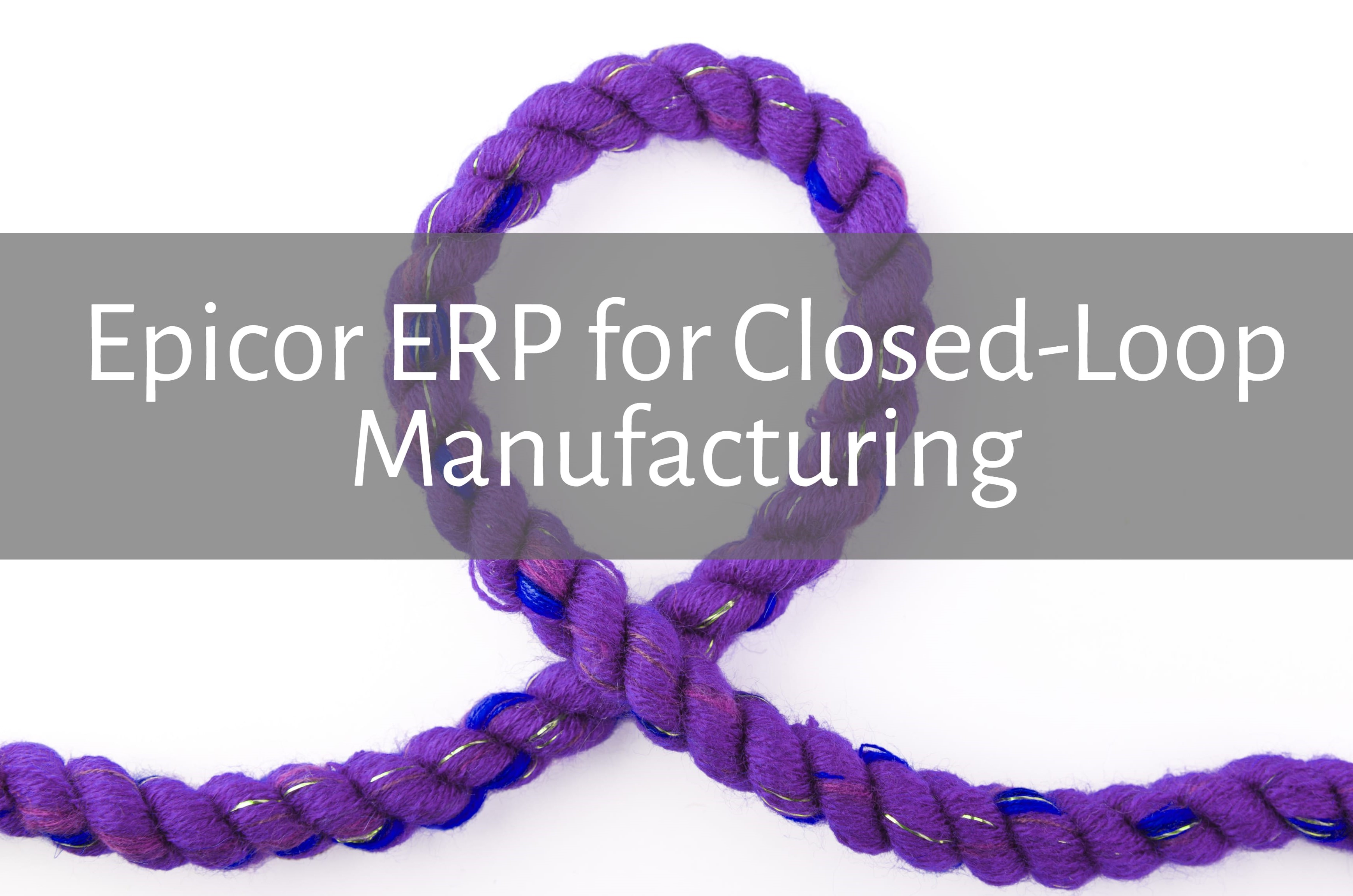
Close the Gaps for Manufacturing Success
The whole point of manufacturing is to create excellent products that satisfy buyers. When one of the many components or operations involved in your supply chain falls through the cracks, manufacturers must pay an astronomical price to repair the damage and their reputation. That’s why your business dedicates huge portions of your budget and employee time to assuring that your product is always up to stringent brand standards, as well as your selective customers’ expectations. To maintain quality assurance and successful operations, quality managers can’t spend all of their time recovering from emergencies and reacting to defects. The entire company must stay on top of quality throughout each product’s lifecycle.
That’s why it’s essential for businesses to implement closed-loop manufacturing processes on the shop floor. With Epicor ERP, superior modules and advanced security features allow businesses to utilize closed-loop manufacturing to consistently put out high-grade products. So, what is closed-loop manufacturing? And how can you set your business on the path to closing the gaps in your manufacturing processes? We’re here to provide some answers.
Closed-Loop Manufacturing
Essentially, closed-loop manufacturing is the practice whereby manufacturers close the gaps between all the stages of their quality management process, reducing risk holistically by fostering collaboration between the stages and understanding that the more communication between the levels of production, the less permeable the manufacturing cycle is to safety risks. This means that the quality and safety of your product is not just your quality team’s job: every single employee and machine on your shop floor plays a direct role in your final product, so it only makes sense that they are responsible in some part for its quality. Closed-loop manufacturing means cross-communication and shared information across your entire manufacturing chain so that everyone is on the same page when it comes to your brand’s mission and quality demands.
One of the many ways modern businesses are investing towards total closed-loop manufacturing is through enterprise resource planning (ERP) software. ERP can incorporate data and information from all areas and team members on your shop floor, consolidating all of your policies and quality checks into a single source of truth for your manufacturing processes and employees. ERP systems provide feedback throughout manufacturing operations to enable users to stay informed and make appropriate adjustments to planning and production.
ERP for Closed-Loop Manufacturing
Quality measures need to be orchestrated at the highest level to be truly effective. If multiple departments are working in silos and failing to communicate their quality checks to other stages, you will inevitably open up holes in your quality process. One team might think that it was another’s responsibility to check the product for a certain defect or other known risk. That team might pass the blame onto someone else for missing an error if it does happen. This cycle of blame is futile and can have devastating costs should it result in angry customers or even a massive recall. An ERP instance gathers all of your back-end data and quality assurance (QA) processes into a single system, ensuring that everyone who has access to that system knows exactly what is going on at each stage of quality management and what their role is in getting the product to market. Because ERP has the capacity to log huge amounts of data concerning your production process, active devices and employee activity, no quality issue goes unnoticed.
With ERP, you can track quality and assurance checks whenever you need to during your manufacturing process—from the research and development stage to any suppliers you may deal with right up to your end product. Any defects will be flagged and analyzed, then the rest of your team is notified to ensure that that error doesn’t happen again. These corrective changes can be mapped across systems and facilities, giving you one place to update policy, rather than running around trying to make sure everyone knows the new actions that need to be taken. Instead of being a risk-reactive manufacturer that is consistently cleaning up messes and paying the price of recalls, ERP systems will empower you to become a risk-preventative company.
One All-Encompassing System
The value of having that single source of truth can be especially advantageous to manufacturers with multiple plants and different offices either nationally or internationally. All your teams will be linked by a unifying system, so that you can enforce quality measures across facilities, and ensure that they are being followed at all times in all plants. Quality checks can be automated and enforced within ERP. Say something in an automated checklist is missed, or there’s a temperature reading not lining up to requirements—your ERP can be programmed to shut down manufacturing on that line instantly until the error is rectified. In the end, ERP will take away all the hassle of trying to coordinate and then enact a company-wide quality mandate. No more paper checks or worry that in the event of a recall or audit you won’t be able to produce all of the necessary information—everything is stored in the system for you.
Wrap Up
ERP software can be a powerful tool to help your manufacturing or distribution business reach new heights in quality management and close the loop in the supply chain. With the help of a modern enterprise system, you can move your crucial quality processes off of paper or clumsy, Excel-reliant legacy software and into a space where your data can realize its full value.
Each manufacturer has unique and specific requirements for the construction of their ERP systems. As an Epicor Platinum Partner, Datix has all the tools you need to protect the integrity of your data and operations. On top of that, we facilitate seamless software integrations through our innovative Unity platform. For more information on implementing your own ERP system, or upgrading a legacy system to a more modern and efficient version, contact an expert at Datix.
{{cta(‘770c1544-d87d-4acb-9fc4-7a25e1385094′,’justifycenter’)}}

